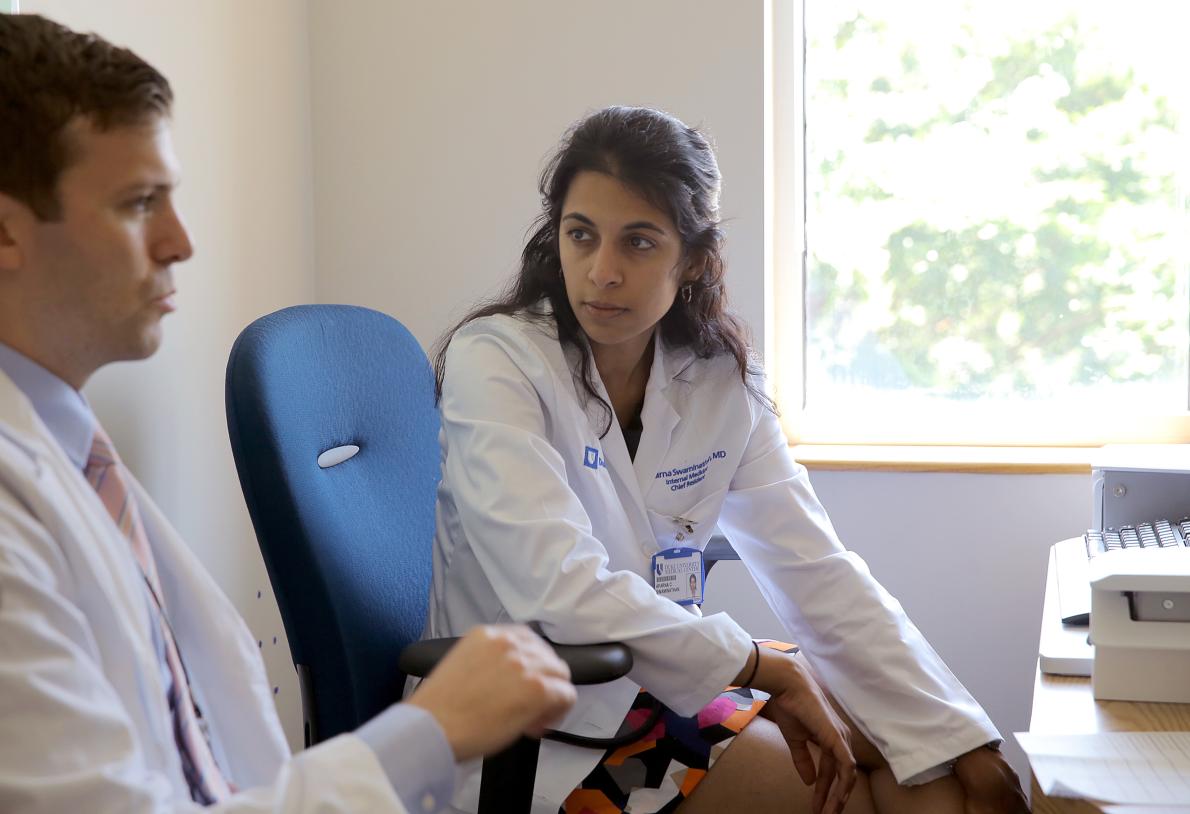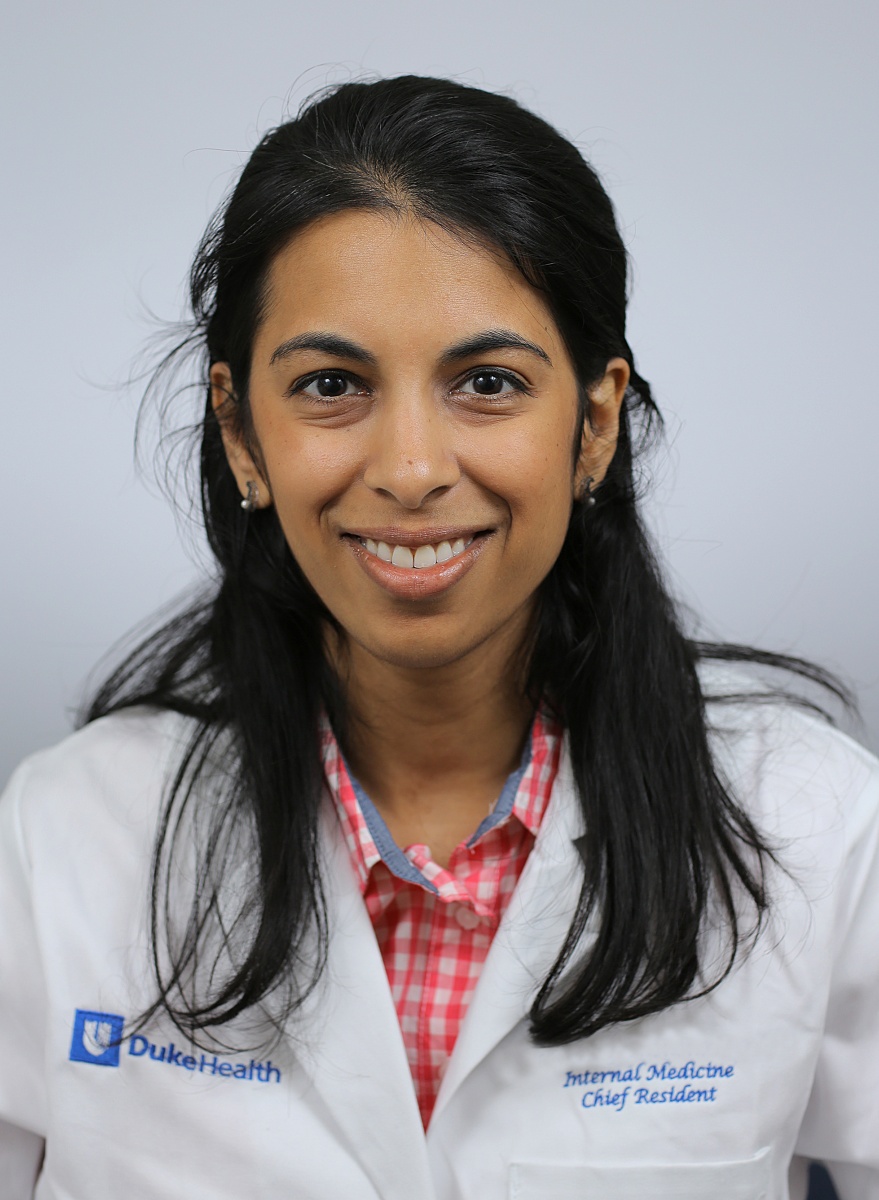
Aparna Swaminathan, MD, is the 2016-17 chief resident for ambulatory medicine and Duke Regional Hospital. Dr. Swaminathan oversees the ambulatory medicine rotations for the Duke Internal Medicine Residency Program. This year, she says, the number of ambulatory rotations have increased and with that Swaminathan has worked to expand clinic opportunities and create various curriculums to enhance learning opportunities. Swaminathan, who grew up in Allentown, PA, completed an undergraduate degree in chemistry at Princeton University, attended medical school at Case Western Reserve University and came to Duke University for internal medicine residency.
Learn more about her goals for her chief resident year and her approach to teaching and learning from residents.
Q: What are your main responsibilities as chief resident for ambulatory medicine and Duke Regional Hospital?
A: My main responsibilities are overseeing the Internal Medicine Residency Program’s ambulatory and Duke Regional Hospital (DRH) rotations, and creating ambulatory experiences - getting feedback on them, creating the curriculum and planning the morning report and noon conference sessions.
At DRH, I help optimize the resident experience of medicine in a community setting. We have created new education initiatives that we hope will help the residents get the most out of the experience. For example, one new initiative at DRH has to do with noon conference. We used to live stream noon conferences from Duke Hospital, but now we have our own live noon conference at DRH. Another example is the interprofessional medicine unit at DRH, which allows all of the general medicine teams to be concentrated on one unit and focuses on interprofessional education.
Q: How is your chief year going and what makes you a good fit for this role?
A: This year is going really well – there have been amazing opportunities for expanding educational initiatives in Duke Regional Hospital and Ambulatory rotations. I am humbled at the opportunity to teach and mentor our talented residents and am enjoying every minute of it. I learn from and am inspired by our house staff daily. I also have a lot of energy surrounding changes and improvements in the program.
 Q: What do you hope to accomplish this year?
Q: What do you hope to accomplish this year?
A: The ambulatory component of our program is really exciting this year because the program has designated a lot more ambulatory time for the residents. I am trying to create great experiences by increasing clinic opportunities and developing a curriculum for each theme to the ambulatory blocks. I also hope to formalize a morning report curriculum to make sure all residents receive didactic education on the basic ambulatory topics. Noon conference is another area where I hope to improve both the curriculum and the conference formats. We are also working on ways to distribute materials with the residents in this social media age. On the Duke Regional side I am looking forward to continuing the educational initiatives and optimizing the community medicine experience for the residents.
Q: What is your approach to leading and working with residents?
A: The residents inspire and motivate me daily to work hard and become a better person. They are thoughtful, motivated, and conscientious. I hope to inspire them as they inspire me. It is a privilege to work with and lead such an amazing group.
Q: How do you give residents the confidence they need to be successful?
A: I try to remind residents that everyone has different strengths and weaknesses. I praise residents for their strengths and ensure that they feel valued. I also reinforce that everyone has an area that he or she could work on, and a lack of identification of these areas would be a missed educational opportunity. I like to encourage the residents to develop a plan to improve on an area of weakness while continuing to showcase their strengths.
Q: Do you remember a key teaching moment from your training that helped you become a better doctor?
A: Rounding with Ralph Corey, MD, at the VA during my second year of residency was formative for me. He challenged me to bring him the data and rationale behind every decision that I made, a practice that I still continue. He also taught me the importance of the small details in medicine. I owe much of the way I practice medicine to his training.
The residents inspire and motivate me daily to work hard and become a better person. They are thoughtful, motivated, and conscientious. I hope to inspire them as they inspire me. It is a privilege to work with and lead such an amazing group.
Q: What is it like working with this group of chief residents?
A: It is an incredible experience - they are all amazing people. I learn so much from this unbelievably talented group. They are also really fun to be around. I’m lucky to have the opportunity to work with them.
Q: How did you end up at Duke?
A: Something on my interview day that really struck me was the sense of family and camaraderie I saw among the residents. I knew this was a place where the residents supported each other and the program supported the residents. The residents pushed each other to be better in a good way. These were the people I wanted to learn from and be like. I was also struck by the Ievel of investment by the faculty in the house staff and have continued to be impressed during my time here. I also wanted to go to a “resident run” hospital where I would learn by doing. Duke fulfilled all of these needs!
Q: Did you always want to go into medicine?
A: I’ve wanted to go into medicine since I was a kid. It was a field that combined my love of science and problem-solving with my desire for service. It made me feel like a complete person.
Q: What do you want to do after your chief resident year?
A: I will finish my fellowship in Pulmonary, Allergy and Critical Care Medicine. I plan on pursuing a masters degree in clinical research at the DCRI next year under the mentorship of Scott Palmer, MD, MHS. I ultimately hope to have a career that spans both clinical research and clinical education.
Q: What do you like to do for fun?
A: I love running and biking and anything outdoors related. I have a 1.5-year-old daughter named Keerthi, who keeps me busy. It’s nice to spend time with her and my husband, Sri.
Q: Is there anything else about you that you’d like to share with Medicine faculty?
A: I’m really humbled and honored for the opportunity to serve as chief resident.